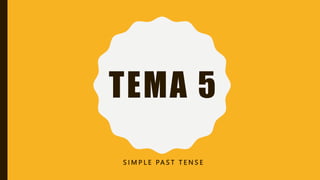
Tema 5 TIEMPO PASADO.pptx
- 1. TEMA 5 S I M P L E PA S T T E N S E
- 2. El Tiempo Pasado Simple se emplea generalmente para expresar acciones que ya se realizaron, también se pueden emplear algunos adverbios de tiempo para enfatizar el momento que se realizó la acción. En este tiempo, los verbos se clasifican en REGULARES e IRREGULARES, los cuales forman su pasado de diferente manera. Los verbos REGULARES forman su pasado como muestra en el siguiente cuadro:
- 3. Los verbos IRREGULARES, como su nombre lo indica forman su pasado de manera irregular, como se aprecia en estos ejemplos:
- 4. • Estas expresiones son adverbios de tiempo que enfatizan el momento que se realizó la acción y que van generalmente al final de la oración. VOCABULARY
- 5. AFFIRMATIVE SENTENCES • El orden de las palabras en las oraciones afirmativas es:
- 6. Analicemos estos ejemplos y traducimos al castellano. My mom went to La Paz last week. Mi mamá fue a La Paz la semana pasada. Mr. Smith worked in the bank last year. El Sr. Smith trabajó en el banco el año pasado. We answered the questions Nosotros respondimos las preguntas. NOTA: PARA CAMBIAR UNA ORACIÓN DEL PRESENTE AL PASADO, SE DEBE TOMAR EN CUENTA SI EL VERBO ES REGULAR O IRREGULAR, POR OTRA PARTE SE DEBE CAMBIAR EL ADVERBIO DE TIEMPO SI ES QUE TUVIERA. EXAMPLES: Ruth types many letters every day. Ruth typed many letters yesterday
- 7. Paul closes the door Paul closed the door I listen rock music on Saturdays I listened rock music last Saturday They watch T.V. every night. They watched T.V. last night Mrs. Jones gets up early every morning Mrs. Jones got up early yesterday morning.
- 8. INTERROGATIVE SENTENCES Mary ran every morning last year Did Mary run every morning last year? My Friends arrived to classes late Did my Friends arrive to classes late? They wrote many letters yesterday Did they write many letters yesterday? Ann read a book last week Did Ann read a book last week? The girls played tennis last Saturday Did the girls play tennis last Saturday? Estas oraciones se construyen poniendo delante del sujeto el auxiliar Did, que es el pasado de do- does; además el verbo principal debe ir en presente. EXAMPLES
- 9. NEGATIVE SENTENCES • Las oraciones negativas se construyen poniendo el auxiliar did más la negación not, delante del verbo principal que debe ir en presente como en las oraciones interrogativas. • Analicemos estos ejemplos: Mary closed the Windows Mary did not close the Windows I worked hard yesterday I did noy work hard yesterday The secretary went to the bank The secretary did not go to the bank She had many problems She did not have many problems Susan and Joe talked last week Sussan and Joe did not talk last week
- 10. QUESTIONS AND ANSWERS A. “Yes, No” QUESTIONS Estas preguntas se contestan afirmativamente con Yes, o negativamente con No, Seguido de una coma. EXAMPLES: Did you study last year? Yes, I did. Did Mary read a book last night? Yes, she did. Did Mr. and Mrs. Rojas work last week? Yes, they did. Did Henry drive his car fast? No, he did not. Did George and Susan play tennis? No, they did not. Did you study for the English test? No, I did not.
- 11. “OR” QUESTIONS • A estas preguntas se debe responder escogiendo una de las opciones que te da la pregunta. • EXAMPLES: Did Jim study medicine or accouting? He studied acoounting Did you come here by taxi or by trufi? I came by trufi Did your mom go to La Paz or to Oruro? She went to Oruro Did the baby drink milk or wáter? He drank milk Did Susan work or study last year? She studied last year Did the Kids play soccer or tennis? They played soccer Did Mr. Brown go to the bank or to his office? He went to his office Did the teacher explain the lesson or the practice? She explained the lesson
- 12. INFORMATION QUESTIONS • Estas preguntas se formulan para pedir un dato informativo que necesitamos saber. Las respuestas son lo más cortas posibles y al punto. • EXAMPLES: Where did you go yesterday? To the hospital What time did you get up yesterday morning? At six o´clock Who did the English homework? Joseph did How did you come home last night? By taxi When did Helen have classes? In the morning What did your dad buy for your birthday? A book